"Water water everewhere" презентация
"Water water everewhere" презентация
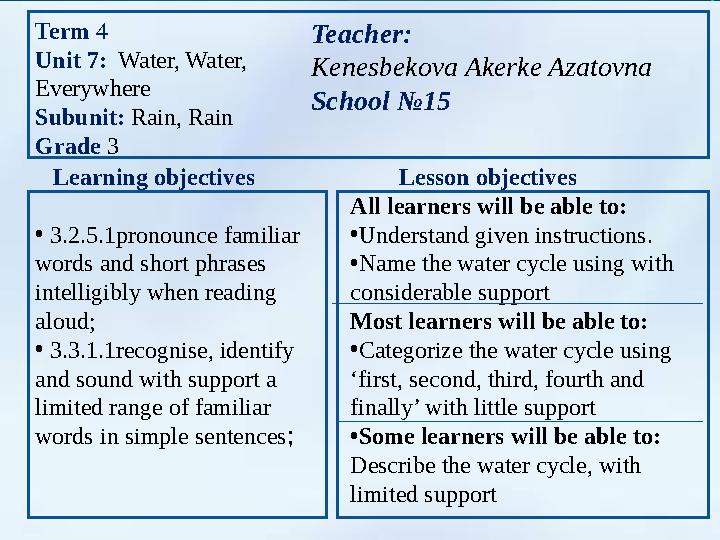

#1 слайд
Term 4
Unit 7: Water, Water,
Everywhere
Subunit: Rain, Rain
Grade 3 Teacher:
Kenesbekova Akerke Azatovna
School №15
Learning objectives
•
3. 2. 5 .1pronounce familiar
words and short phrases
intelligibly when reading
aloud;
•
3. 3. 1 .1recognise, identify
and sound with support a
limited range of familiar
words in simple sentences ; Lesson objectives
All learners will be able to:
•
Understand given instructions.
•
Name the water cycle using with
considerable support
Most learners will be able to:
•
Categorize the water cycle using
‘first, second, third, fourth and
finally’ with little support
•
Some learners will be able to:
Describe the water cycle, with
limited support
1 слайд
Term 4 Unit 7: Water, Water, Everywhere Subunit: Rain, Rain Grade 3 Teacher: Kenesbekova Akerke Azatovna School №15 Learning objectives • 3. 2. 5 .1pronounce familiar words and short phrases intelligibly when reading aloud; • 3. 3. 1 .1recognise, identify and sound with support a limited range of familiar words in simple sentences ; Lesson objectives All learners will be able to: • Understand given instructions. • Name the water cycle using with considerable support Most learners will be able to: • Categorize the water cycle using ‘first, second, third, fourth and finally’ with little support • Some learners will be able to: Describe the water cycle, with limited support
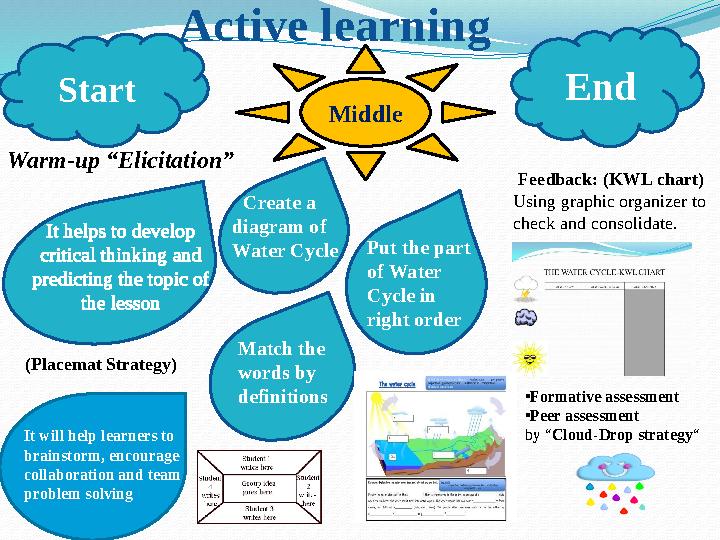
#2 слайд
Active learning
Start
Middle End
It helps to develop
critical thinking and
predicting the topic of
the lessonWarm-up “Elicitation”
(Placemat Strategy) Create a
diagram of
Water Cycle Put the part
of Water
Cycle in
right order
Match the
words by
definitions Feedback: (KWL chart)
Using graphic organizer to
check and consolidate.
•
Formative assessment
•
Peer assessment
by “ Cloud-Drop strategy “
It will help learners to
brainstorm, encourage
collaboration and team
problem solving
2 слайд
Active learning Start Middle End It helps to develop critical thinking and predicting the topic of the lessonWarm-up “Elicitation” (Placemat Strategy) Create a diagram of Water Cycle Put the part of Water Cycle in right order Match the words by definitions Feedback: (KWL chart) Using graphic organizer to check and consolidate. • Formative assessment • Peer assessment by “ Cloud-Drop strategy “ It will help learners to brainstorm, encourage collaboration and team problem solving
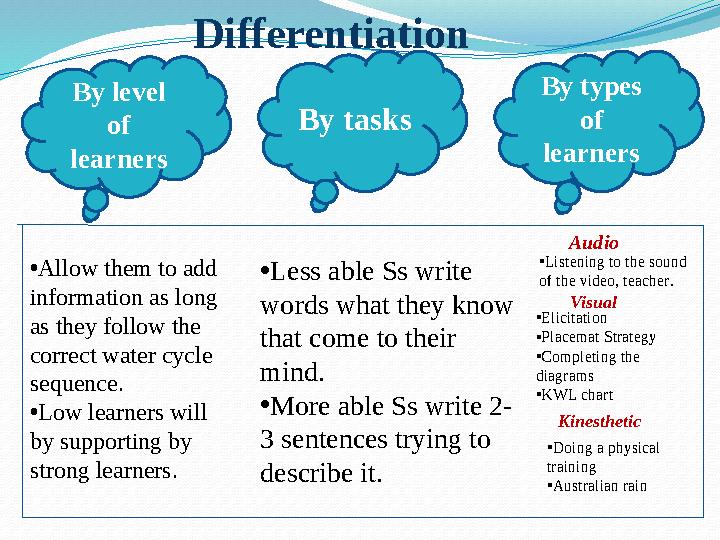
#3 слайд
By level
of
learners By tasks By types
of
learnersDifferentiation
•
Less able Ss write
words what they know
that come to their
mind.
•
More able Ss write 2-
3 sentences trying to
describe it.•
Allow them to add
information as long
as they follow the
correct water cycle
sequence.
•
Low learners will
by supporting by
strong learners. Audio
•
Listening to the sound
of the video, teacher .
Visual
•
Elicitation
•
Placemat Strategy
•
Completing the
diagrams
•
KWL chart
Kinesthetic
•
Doing a physical
training
•
Australian rain
3 слайд
By level of learners By tasks By types of learnersDifferentiation • Less able Ss write words what they know that come to their mind. • More able Ss write 2- 3 sentences trying to describe it.• Allow them to add information as long as they follow the correct water cycle sequence. • Low learners will by supporting by strong learners. Audio • Listening to the sound of the video, teacher . Visual • Elicitation • Placemat Strategy • Completing the diagrams • KWL chart Kinesthetic • Doing a physical training • Australian rain
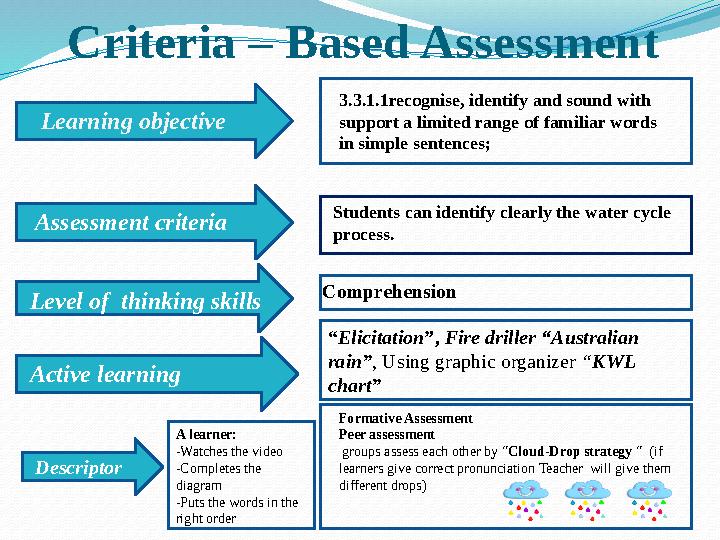
#4 слайд
Criteria – Based Assessment
Learning objective 3. 3. 1 .1recognise, identify and sound with
support a limited range of familiar words
in simple sentences;
Assessment criteria Students can identify clearly the water cycle
process.
Level of thinking skills
Active learning Comprehension
“ Elicitation ”, Fire driller “Australian
rain” , Using graphic organizer “ KWL
chart”
Descriptor A learner:
-Watches the video
-Completes the
diagram
-Puts the words in the
right order Formative Assessment
Peer assessment
groups assess each other by “ Cloud-Drop strategy “ (if
learners give correct pronunciation Teacher will give them
different drops)
4 слайд
Criteria – Based Assessment Learning objective 3. 3. 1 .1recognise, identify and sound with support a limited range of familiar words in simple sentences; Assessment criteria Students can identify clearly the water cycle process. Level of thinking skills Active learning Comprehension “ Elicitation ”, Fire driller “Australian rain” , Using graphic organizer “ KWL chart” Descriptor A learner: -Watches the video -Completes the diagram -Puts the words in the right order Formative Assessment Peer assessment groups assess each other by “ Cloud-Drop strategy “ (if learners give correct pronunciation Teacher will give them different drops)
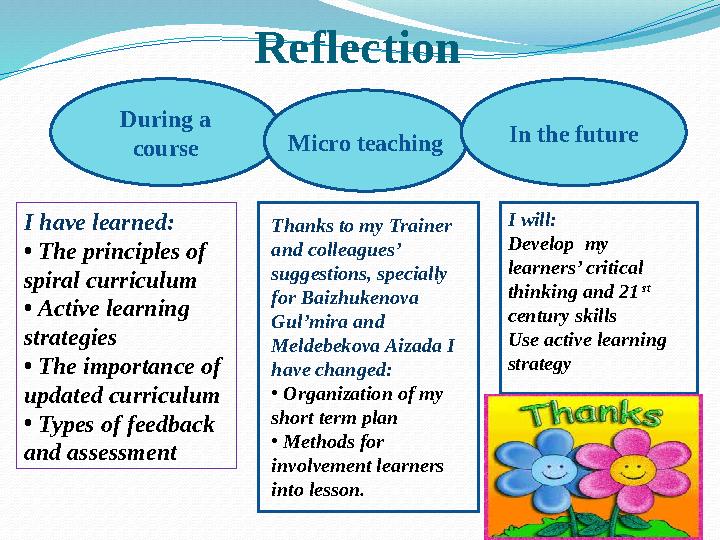
#5 слайд
Reflection
During a
course In the future
Micro teaching
I have learned:
•
The principles of
spiral curriculum
•
Active learning
strategies
•
The importance of
updated curriculum
•
Types of feedback
and assessment Thanks to my Trainer
and colleagues’
suggestions, specially
for Baizhukenova
Gul’mira and
Meldebekova Aizada I
have changed:
•
Organization of my
short term plan
•
Methods for
involvement learners
into lesson. I will:
Develop my
learners’ critical
thinking and 21 st
century skills
Use active learning
strategy
5 слайд
Reflection During a course In the future Micro teaching I have learned: • The principles of spiral curriculum • Active learning strategies • The importance of updated curriculum • Types of feedback and assessment Thanks to my Trainer and colleagues’ suggestions, specially for Baizhukenova Gul’mira and Meldebekova Aizada I have changed: • Organization of my short term plan • Methods for involvement learners into lesson. I will: Develop my learners’ critical thinking and 21 st century skills Use active learning strategy

шағым қалдыра аласыз
















